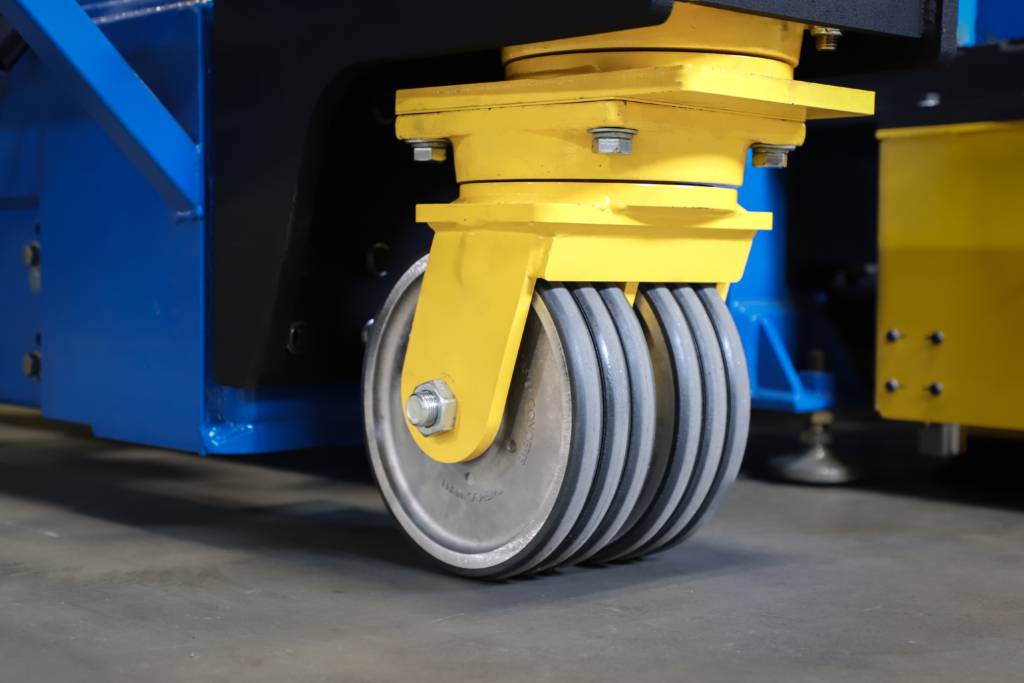
Choosing the Right Warehouse Motorized Cart for Heavy-Duty Material Handling.

In the fast-paced world of warehouse operations, where efficiency and speed are paramount, the tools you use can make or break your workflow. Picture this: motorized material handling carts gliding effortlessly across the floor, carrying hefty loads with ease and allowing your team to focus on more strategic tasks. The warehouse motorized cart isn’t just a piece of equipment, it’s a game-changer for heavy-duty material handling. With the right motorized cart, you can streamline your operations, enhance safety, and boost productivity in ways you never thought possible.
But with so many options available, how do you choose the best one for your needs? In this guide, we’ll take you through everything you need to know to select the perfect motorized cart for your warehouse—one that meets the demands of your business, supports your team, and helps you navigate the future of warehouse automation.
Why Warehouse Motorized Carts Are Essential for Heavy-Duty Material Handling.
In modern warehouses, handling large and heavy items efficiently is essential. Warehouse motorized carts offer a powerful solution by automating the transportation of materials across the facility. These carts come with motors that enable them to carry heavy loads without the need for human effort, reducing strain on workers and enhancing productivity. Furthermore, motorized platform carts and other types of motorized warehouse tools are essential for optimizing warehouse layouts and reducing bottlenecks.
The use of motorized carts also supports the movement toward warehouse automation tools, which aim to improve speed, accuracy, and efficiency in operations. Whether you’re moving boxes, pallets, or heavy machinery components, selecting the right motorized cart will ensure that your operations run smoothly.
Key Considerations When Selecting a Warehouse Motorized Cart.
When choosing the right motorized cart for heavy-duty material handling, several factors should be taken into account. These factors will help ensure that the cart you select is durable, efficient, and meets your specific operational needs.
-
Load Capacity for Warehouse Carts
 The load capacity is perhaps the most important factor when selecting a warehouse motorized cart. Heavy-duty material handling requires carts that can handle substantial weight, especially if your warehouse stores large items, machinery, or bulk materials. Carts come in different load capacities, ranging from lighter-duty models with a load capacity of 500 pounds to those that can support up to several thousand pounds.
The load capacity is perhaps the most important factor when selecting a warehouse motorized cart. Heavy-duty material handling requires carts that can handle substantial weight, especially if your warehouse stores large items, machinery, or bulk materials. Carts come in different load capacities, ranging from lighter-duty models with a load capacity of 500 pounds to those that can support up to several thousand pounds.
Before making a purchase, assess the weight of the materials you typically handle and select a motorized cart with a load capacity that exceeds the heaviest item you plan to transport. This ensures that the cart can handle the load without straining the motor, preventing mechanical failures and prolonging the lifespan of the cart.
-
Cart Size and Dimensions
The dimensions of your motorized cart are also crucial. A cart that is too large may be difficult to maneuver in tight spaces, while a cart that is too small may not be able to accommodate the materials you need to transport. Take measurements of your warehouse aisles and workspaces to determine the ideal cart size.
If you’re handling large or bulky materials, you may need a motorized platform cart with a broad surface area to accommodate oversized loads. On the other hand, if your warehouse has narrow aisles or smaller items, a more compact model might be a better fit.
As a leading designer and manufacturer of custom-engineered solutions for over 2 decades, our specialty is integrated drive systems for application-specific material handling carts and the movement of heavy equipment from 1 to 100 tons.
From complete systems to retrofitting existing equipment, Conceptual Innovations can:
- Engineer and manufacture a turnkey solution for your application
- Engineer a drive system for integration into equipment under development
- Design a drive system to upgrade or retrofit existing equipment
-
Ergonomic Warehouse Solutions
Ergonomics play a key role in warehouse design, especially regarding worker health and safety. Traditional manual carts can lead to fatigue and injuries from pushing or pulling heavy loads. Motorized warehouse carts, however, minimize the need for physical exertion by using motors to transport goods.
When selecting a motorized cart, it’s important to choose one with ergonomic features, such as adjustable handles, easy-to-use controls, and cushioned platforms for load support. These features reduce the risk of strain injuries and improve the comfort of your workers. Additionally, some carts come equipped with features like easy-to-control speed settings and variable direction options that make navigation and operation more user-friendly.
-
Battery Life and Charging Time
For motorized carts to perform effectively in warehouse settings, they need a reliable power source. Most motorized carts are powered by rechargeable batteries. A cart with a longer battery life can operate for extended periods without frequent recharging, which increases productivity.
The time it takes to charge the battery is another key factor. In fast-paced warehouse environments, downtime can be costly. Ideally, look for motorized carts with batteries that offer fast charging times and long operational durations. Depending on the size of your warehouse and the intensity of your material handling tasks, a lithium-ion battery might be an optimal choice due to its efficiency and longevity.
Another way to increase battery life is to equip your motorized cart with casters that minimize friction and scrubbing, requiring less power to move the cart. These can be used in conjunction with your powered casters.
-
Maneuverability and Terrain Adaptability
 A warehouse motorized cart needs to be easy to maneuver, particularly if your facility has narrow aisles, tight corners, or uneven terrain. Look for carts with high-quality wheels and strong suspension systems that can smoothly traverse these obstacles without compromising the cart’s stability.
A warehouse motorized cart needs to be easy to maneuver, particularly if your facility has narrow aisles, tight corners, or uneven terrain. Look for carts with high-quality wheels and strong suspension systems that can smoothly traverse these obstacles without compromising the cart’s stability.
Some motorized carts are equipped with swivel wheels or all-terrain tires, allowing them to navigate various types of warehouse flooring, including concrete, tile, or rougher surfaces. If your warehouse has ramps, uneven flooring, or external areas, choosing a motorized cart with enhanced traction and stability will ensure smooth transportation of materials.
-
Durability and Maintenance
Heavy-duty material handling demands equipment that is built to last. Look for motorized carts made from durable materials such as steel or reinforced polymers, which can withstand the wear and tear of frequent use in a warehouse environment. The frame and construction should be strong enough to support heavy loads while being resistant to rust or corrosion.
In addition to durability, it’s important to consider ease of maintenance. Regular maintenance ensures that your cart operates at peak efficiency and extends its lifespan. Check whether the manufacturer offers comprehensive service packages, replacement parts, and user-friendly instructions for routine upkeep.
-
Cost-Effectiveness and ROI
While it’s tempting to opt for the cheapest option available, investing in a high-quality warehouse motorized cart can save you more in the long run by reducing labor costs, minimizing downtime, and improving operational efficiency. Consider the total cost of ownership, including initial purchase price, maintenance, and battery replacement costs. The right motorized cart should provide a positive return on investment (ROI) by boosting productivity and reducing the need for manual labor.
-
Safety Features

When handling heavy materials, safety is paramount. Choose a motorized cart that includes safety features such as automatic braking, emergency stop buttons, and speed limiters. These features can prevent accidents and ensure that your warehouse workers remain safe while operating the carts.
Some carts also come equipped with anti-tip mechanisms, which can help prevent tipping when carrying heavy or uneven loads. Additionally, ensuring that your warehouse carts have bright LED lights or reflectors is essential for visibility, especially in low-light environments.
The Best Warehouse Motorized Cart for Your Needs.
To make the best choice for your business, consider the specific needs of your warehouse operation. Whether you require a robust industrial motorized cart to move large, heavy items or a smaller, more compact cart for lighter loads, selecting the right one can significantly improve your warehouse’s productivity and safety.
Motorized platform carts are excellent for heavy-duty material handling, as they provide a large, flat surface for bulky items. For more specialized tasks, such as transporting smaller items in tight spaces, a compact, motorized cart may be a better fit. Regardless of the type, it’s important to ensure that the cart you choose aligns with your warehouse’s layout, your load capacity needs, and your long-term operational goals.
A Final Word.
Choosing the right warehouse motorized cart for heavy-duty material handling can seem like a complicated decision, but with the right considerations, you can find a solution that optimizes both productivity and safety in your warehouse. Focus on key features such as load capacity, maneuverability, ergonomic design, and battery life to find a motorized cart that meets your unique needs.
By investing in the best warehouse motorized cart, you can streamline your operations, reduce workplace injuries, and improve the overall efficiency of your warehouse. With the right equipment in place, you’ll be better positioned to handle the demands of modern industrial material handling and make the most of your warehouse’s full potential.
If you’re looking for expert guidance in choosing the best industrial motorized carts for your warehouse, don’t hesitate to reach out to Conceptual Innovations. We specialize in providing ergonomic and efficient material handling solutions tailored to your business needs. Contact us today!
